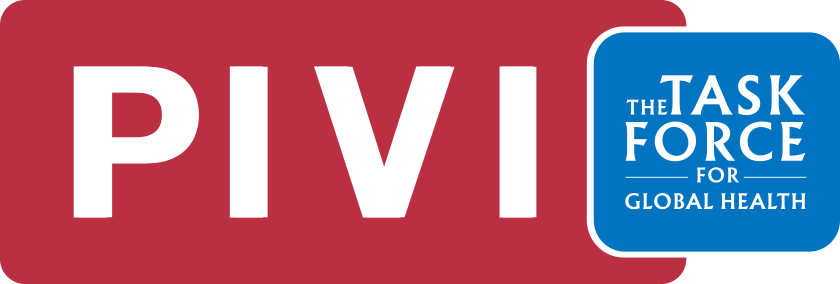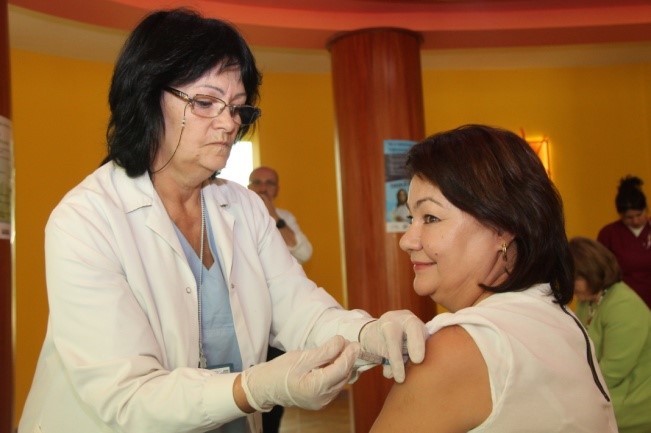The Partnership for Influenza Vaccine Introduction’s (PIVI) partnerships have grown and matured since its launch in 2013. During that time, PIVI has seen that regional collaborations often help partners work more efficiently, as they can share skills and best practices, as well as discuss ways to address programmatic gaps and challenges.
A key example of this is PIVI’s experience with the South East European Center of Infectious Diseases (SECID).
SECID is a consortium of 10 countries in the South East European (SEE) region, and is a part of the South-Eastern Europe Health Network (SEEHN) which was founded in 2001 to “promote peace, reconciliation and health in the region.” Countries in SECID include Albania, Bosnia and Herzegovina, Bulgaria, Croatia, Israel, the Republic of North Macedonia, the Republic of Moldova, Montenegro, Romania, and the Republic of Serbia.
The mission statement of SECID is to “develop and support evidence-based public health interest projects and health system development initiatives.” In keeping with that mission, the group focuses on vaccination, HIV/AIDS, women’s health, and influenza.
The Centers for Disease Control (CDC) first partnered with SECID in 2014 through a cooperative agreement to support increased influenza surveillance activities. In total, influenza surveillance activities in nine countries in the region were supported through this 5-year agreement, and this work was the foundation for the PIVI-SECID relationship, which began in 2016. The first major SECID/PIVI initiative was providing influenza vaccine to Albania to build its immunization program among health care workers and other target groups. During the first years of the SECID and PIVI collaboration, PIVI supported work in Albania to understand influenza vaccination knowledge, attitudes, and practices among pregnant women and their health care providers. In addition, PIVI supported multiple communications campaigns to raise awareness for influenza vaccination. Due to the success of these efforts, the partnership between PIVI and SECID has since expanded outside of Albania and more broadly to the SEE region. PIVI currently is working directly with North Macedonia to facilitate influenza vaccine donation, and with SECID to support regional efforts.
Partnering with in-country representatives is key to the success of building influenza vaccination programs. Partners work together to share experiences and support similar activities across countries, leveraging expertise and experience in the region. This has led to multiple regional efforts, including a multi-country media training, technical projects to understand the cost of influenza vaccination for a country, an effort to convene a regional National Immunization Technical Advisory Group (NITAG), as well as efforts to facilitate regional joint vaccine procurement.
A major step toward establishment of a regional NITAG occurred in June 2019. With the support of PIVI, SECID hosted a regional training to outline terms of reference (ToR) for a regional expert group on vaccination policy for vaccine introduction. Countries in the region do not generally have enough experts to establish country-level working groups. SECID leveraged input from partners in all countries to establish a region-level working group. While this meeting was just the first step in a process to establish such a group, it was successful in opening dialogue between stakeholders across the region. This approach can be used as a model for other regions where country-level expertise might be scarce.
This past September building from the summer training of regional experts (and previous initiatives underway to jointly procure laboratory supplies and other routine immunizations), SECID hosted a meeting to discuss group influenza vaccine procurement in the region. The high cost-per-dose is an important hurdle to sustainable investment in influenza vaccines in the region and limits the reach of country immunization programs.
Other regions have encountered similar challenges. Multiple groups—which include regional initiatives in the Americas with the PAHO revolving fund and in the Baltic countries—have found that coordinated efforts to pool investment to negotiate lower prices are an excellent way to address this issue. Experts from several of these groups, and from the PIVI team, will participate in the upcoming workshop, to share their experiences, successes, and challenges in joint vaccine procurement.
The success of SECID in the SEE region is largely due to between-country mentorship. For example, an economist from Albania traveled to Bulgaria to assist in implementing a costing tool, drawing from Albania’s experience using the same tool the previous year. Experts in each country have sought out colleagues facing similar challenges and leveraged the experiences of these regional partners. Collaboration and communication among countries with similar population demographics, growth and development goals, and public health challenges leads to cost-effective and sustainable growth of influenza prevention and control in the region.
Though the SEE region is unique, many of the challenges SECID faces in preventing and controlling influenza are similar to those that countries in other regions of the world experience. Lessons from SECID’s regional efforts will be useful as PIVI explores regional collaborations in other parts of the world in the next few years.
To learn more about SECID’s work, please click here.


